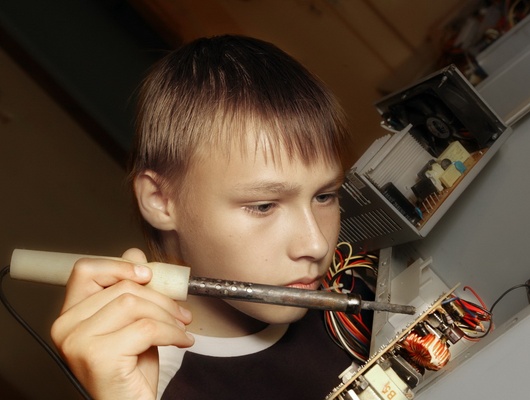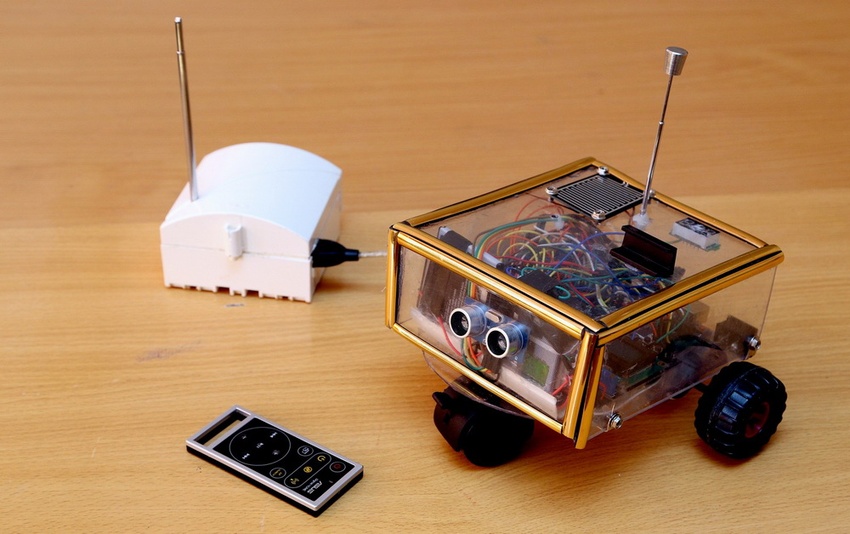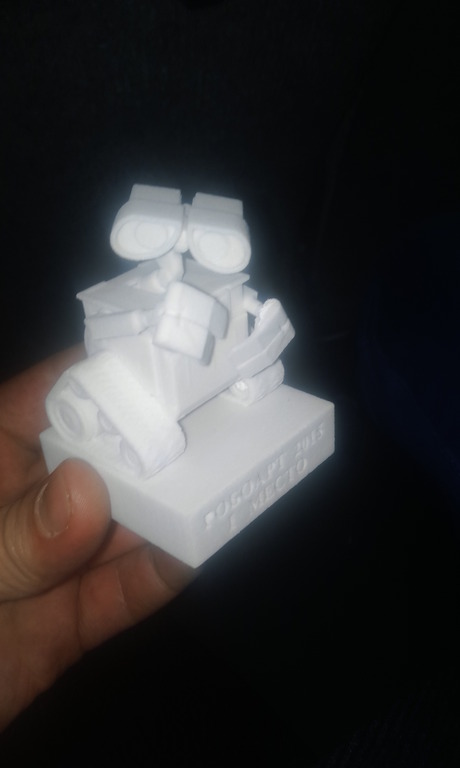Arduino Circle and more
Having familiarized myself with the experience of various teachers in teaching schoolchildren the basics of programming, including on Habré, I decided to add my own 5 kopecks. Working at school for the fourth year, two years of them I have been trying to engage in technical creativity with schoolchildren. It all started with a radio point and in-school radio.

Then there were experiments with electroplating on a self-made power supply unit. Repair of ancient school computers. Later, on the advice of one of the students, I bought the first Arduino Uno and a sound sensor with my money. And off we go. First, like everyone else, a diode, then a relay. Having disassembled the old printer, they began to play with the engines. There are lego kits at school, but I believe that they are already unsuitable for projects at the level of 10-11 grades and while they are lying, they are waiting in the wings.
The first serious project was a weather station robot, assembled on a knee from everything that was at hand. The remains of the printer, plexiglass from old broken stands, controlled by a remote control from a projector from my computer cabinet. The robot collected information about temperature, humidity and precipitation with the determination of their type and transmitted data through the RF module to a computer. We won a number of contests with him.

First, the regional competition “Children, Technique, Creativity”, then “We-Belgorod residents, think and decide to act” (as a result of which my student was taken to our BSTU named after Shukhov, where he decided to study further in this direction). Just last week we arrived from Roboart in Voronezh. Where also became the winners of the exhibition.

In April we plan to go to Tambov to the robotics festival.
It is extremely sad that in our region, as, in fact, in most regions, robotics at school is synonymous with LEGO, or at best Fischertechnics. Although arduino is cheaper and more interesting.
There are simply no Arduino kits in schools. I bought everything for my club myself, at my own expense (thanks to my wife that she suffers this). On one of the sites, the guys helped to raise money for a soldering station (thank you very much), otherwise they pay 500 rubles for the club, and I spend about 2000 from mine. I try to make the guys “grow” in relation to programming and electrical engineering.
At first it was uno, then already assembling its own boards, programming a bare controller, recently acquired Raspberry PI. Starting with Processing, we switched to a full-fledged SI:
A week ago, they collected a combination lock on the Atmega8, with an actuator for the central lock of the car.
We are also now working on the implementation of automatic all-wheel drive on a wheeled robot for another competition.
Guys who have any unnecessary electronic components - I will be happy to help, because I have already depleted my supplies. And, unfortunately, teaching salary does not allow to buy much.

Then there were experiments with electroplating on a self-made power supply unit. Repair of ancient school computers. Later, on the advice of one of the students, I bought the first Arduino Uno and a sound sensor with my money. And off we go. First, like everyone else, a diode, then a relay. Having disassembled the old printer, they began to play with the engines. There are lego kits at school, but I believe that they are already unsuitable for projects at the level of 10-11 grades and while they are lying, they are waiting in the wings.
The first serious project was a weather station robot, assembled on a knee from everything that was at hand. The remains of the printer, plexiglass from old broken stands, controlled by a remote control from a projector from my computer cabinet. The robot collected information about temperature, humidity and precipitation with the determination of their type and transmitted data through the RF module to a computer. We won a number of contests with him.

First, the regional competition “Children, Technique, Creativity”, then “We-Belgorod residents, think and decide to act” (as a result of which my student was taken to our BSTU named after Shukhov, where he decided to study further in this direction). Just last week we arrived from Roboart in Voronezh. Where also became the winners of the exhibition.

In April we plan to go to Tambov to the robotics festival.
It is extremely sad that in our region, as, in fact, in most regions, robotics at school is synonymous with LEGO, or at best Fischertechnics. Although arduino is cheaper and more interesting.
There are simply no Arduino kits in schools. I bought everything for my club myself, at my own expense (thanks to my wife that she suffers this). On one of the sites, the guys helped to raise money for a soldering station (thank you very much), otherwise they pay 500 rubles for the club, and I spend about 2000 from mine. I try to make the guys “grow” in relation to programming and electrical engineering.
At first it was uno, then already assembling its own boards, programming a bare controller, recently acquired Raspberry PI. Starting with Processing, we switched to a full-fledged SI:
A week ago, they collected a combination lock on the Atmega8, with an actuator for the central lock of the car.
We are also now working on the implementation of automatic all-wheel drive on a wheeled robot for another competition.
Guys who have any unnecessary electronic components - I will be happy to help, because I have already depleted my supplies. And, unfortunately, teaching salary does not allow to buy much.
